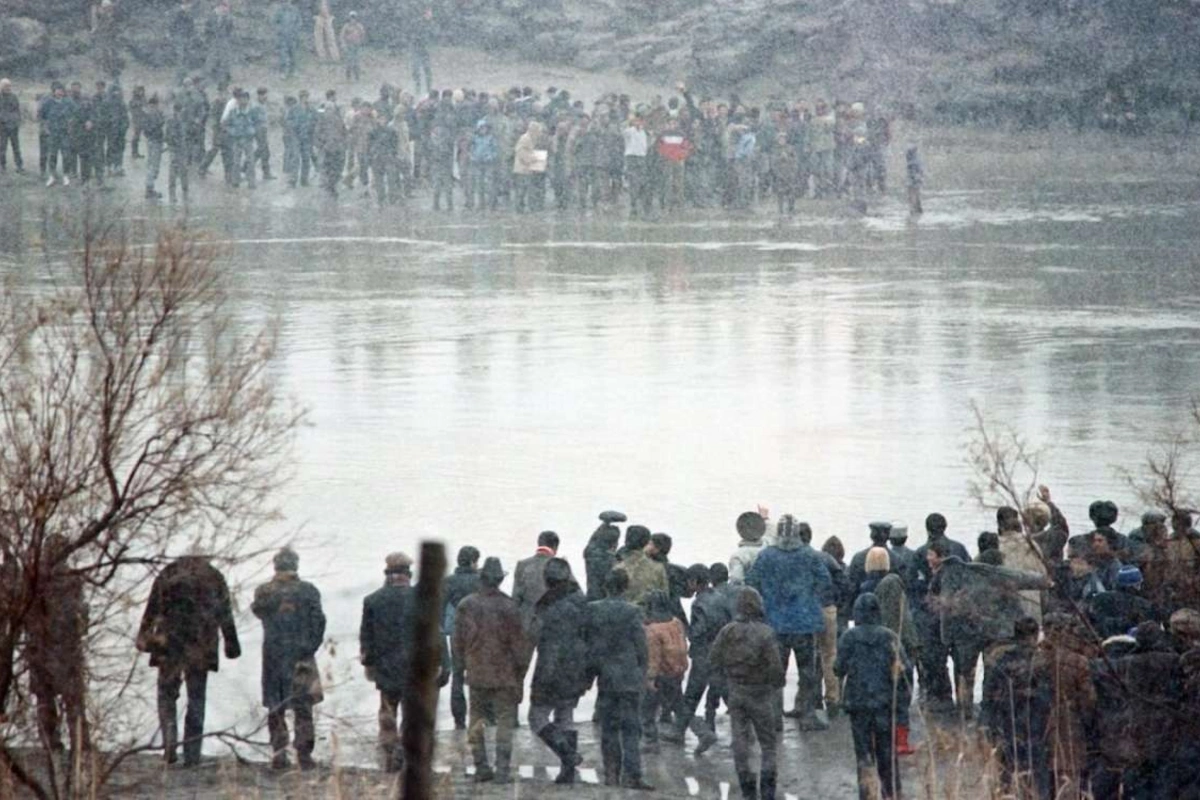
December 31 is the World Solidarity Day of Azerbaijanis, a day commemorating the tearing down of border fences between Nakhchivan and Iran in 1989. What’s happened to Nakhchivan since then, and why has its leader recently resigned?
Image: IRNA
Each year December 31 is celebrated as "World Solidarity Day of Azerbaijanis," a commemoration of the events of 1989, during which Azerbaijanis on both sides of the River Araz tore down up to 120 km of border fences. For the first time in generations, this allowed brethren in both Iran and Azerbaijan the chance to meet—or at least shout greetings—to each other. Some crossed the river to pray in Iranian mosques. This was one of the first open acts leading towards the independence of the various Soviet republics from the crumbling USSR. The part of Azerbaijan where this happened was Nakhchivan. That’s a large, disconnected ‘exclave’ – an area of one country that is disconnected from the rest of the nation by the international borders of at least one other country.
In Western Europe, classic examples of exclaves include Llívia, a Spanish town entirely encircled by France, and Baarle-Hertog, a truly absurd cartographic jigsaw with fragments of Belgium inside the Netherlands and even a couple of chunks of Dutch territory within that.
Both of the above are now mere curiosities: membership of the EU makes their borders of fairly minor importance these days. However, Nakhchivan, as with several other of the Caspian Region countries’ exclaves, has become awkward to reach in the post-Soviet era. Despite its ground breaking demands for freedom in 1989-90, it has been disconnected from the rest of Azerbaijan by the hostile closed borders of Armenia since the 1990s. Connections to Baku are by air or require overland diversions via Iran, or via Georgia plus Turkey. A major drive for Baku since the 2020 Second Karabakh War has been the creation of friction-free passage between Nakhchivan and the rest of the country, but for now the Armenia-Azerbaijan borders remain closed.
For most of the period of Azerbaijan’s independence, Nakhchivan’s geopolitically enforced isolation, along with its special status as an “autonomous republic”[1], has meant that the exclave has acted as something of a law unto itself, though things have changed greatly over the years.
Back in the 1990s, when I made my first trip there, corruption at the border with Turkey was all too blatant. Myself and another travel writer of my acquaintance, travelling entirely separately, were both essentially ‘charged’ US$100 to cross. Our passports, taken by immigration or customs officers, were held as collateral during price ‘negotiations’. At that time, the exclave felt like a police state, and taxi drivers who took me on sightseeing trips were obliged to report my movements to the KGB equivalent. Two decades later, things had relaxed considerably as the main city spruced itself up into an almost surreally neat showcase of an urban centre. Then in the last few years, the exclave’s apparent reticence to encourage tourists has been turned on its head. Monuments have been restored (in some cases over-restored), once out-of-bounds sites have reopened, and staff on the Nakhchivan-Julfa railway encourage landscape photography that a few years ago would have earned you a police interrogation. A small ski- and mountain resort has opened at Aghbulaq, the exclave offers birdwatching tours for ornithologists, and the once almost invisible crag-top ruins of Alinja’s medieval castle have been made accessible and turned into the fascinating ‘Machu Picchu of the Caucasus.’ All in all, the region that was once labelled the ‘North Korea’ of Eurasia has blossomed into a place that the BBC described as trying to be amongst the world’s most sustainable.
Behind the scenes, all of these transformations have essentially occurred under the leadership of one man. Since 1995, Nakhchivan had regularly re-elected Vasif Talibov as chairman of its legislative assembly. He had come to be seen as a de facto ruler of the region, described by Freedom House as a "noted autocrat" who ran Nakhchivan as a "private fiefdom." However, in what could be the biggest of all changes in Nakhchivan’s recent history, Talibov himself has now stepped down after 27 years in power, a period widely seen as having been repressively authoritarian, with Talibov also maintaining tight reigns over the exclave’s economy.
Commentators argue as to the reasons for his resignation. Few doubt that his hand had been forced by Baku. Theories vary as to why, and why now, but the move fits with a general series of leadership changes in which Azerbaijani President Ilham Aliyev has expressed resolve to curb corruption by imposing more central oversight on once wayward provinces. Certainly, while less obvious than in the 1990s, Nakhchivan retained a reputation for corrupt or unconventional processes. Most infamously, Nakhchivan reportedly maintained the Bolshevik ‘subotnik’ idea of forcing state employees to perform (virtually) unpaid manual labour at weekends, among other abuses.
Nakhchivan’s future direction appears to be one of drawing closer to Baku, with some rumours even suggesting that the exclave’s status as an autonomous republic might be reviewed. We’ll see.
[1] part of Azerbaijan but with its own legislature.
Share on social media